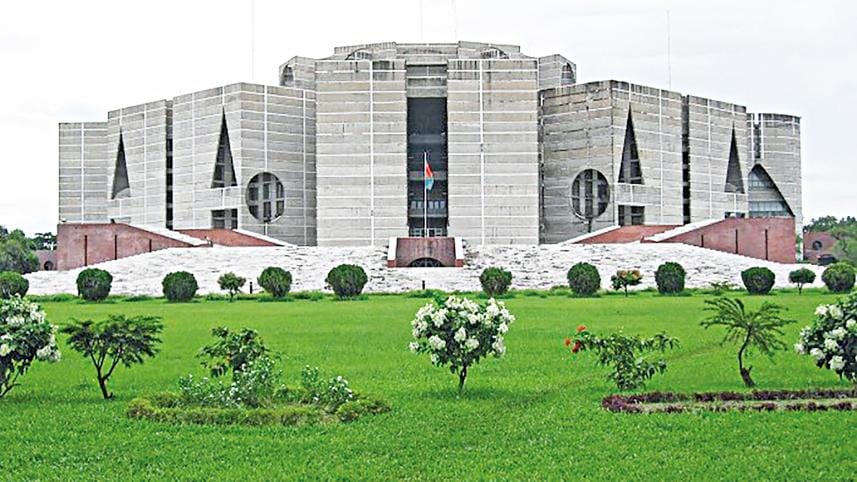50 Years of Bangladesh Constitution In a nutshell

Proclamation of Independence (10 April 1972)
Given effect from 26 March 1971, the Proclamation along with the Laws Continuance Enforcement Order, 1971 played a huge role in restoring internal legal system and solidifying the creation of the new sovereign state. From an international law perspective, the proclamation is a form of 'Unilateral Declaration of Independence', which is one of the legitimate ways for the creation of a new sovereign country as established by the ICJ in its advisory opinion concerning the Independence of Kosovo in 2010.
Making of the 1972 Constitution
A Constituent Assembly was formed on 23 March 1972 through the Constituent Assembly of Bangladesh Order, 1972. In the first session of the new Constituent Assembly, a 34-member drafting committee was formed to be led by Dr. Kamal Hossain to draft the Constitution. Adopted on 4 November 1972, the Constitution came into force on 16 December 1972. To note that until the Constitution was officially launched, the Provisional Constitution of Bangladesh Order, 1972 and the Constituent Assembly of Bangladesh Order, 1972 together facilitated the governance of the Republic.
Constitutional Amendments
1st Amendment (1973): Any law made for the purpose of detention, prosecution or punishment of any person, who is a member of any armed or defence or auxiliary forces or who is a prisoner of war, for committing genocide, crimes against humanity, war crimes or other crimes under international law will not be declared to be void. Moreover, certain rights such as right to protection of law (art 31), right against retrospective operation of law (art 35.1), right to a speedy and public trial by an independent and impartial court (art 35.3), and right to enforcement of fundamental rights (art 44) were made non-applicable for any person falling under the newly amended provision.
2nd Amendment (1973): Any amendment made under art 142 would not be declared to be void under art 26. Art 33 was also substituted whereby changes were brought in for facilitating prevention detention under law. Moreover, arts 141A-141C were inserted empowering the President to proclaim emergency on the ground that the security or economic life of Bangladesh, or any part thereof, is threatened by war or external aggression or internal disturbance. Certain fundamental rights such as freedom of movement (art 36), freedom of assembly (art 37), freedom of association (art 38), freedom of thought and conscience, and of speech (art 39), freedom of profession or occupation (art 40), right to property (art 42), and right to enforce fundamental rights (art 44) were made subject to suspension during emergencies.
3rd Amendment (1974): The newly amended art 2 was made to facilitate the Agreement between the Governments of Bangladesh and India (1974) regarding the exchange of enclaves. However, the legality of the treaty itself was challenged in Kazi Mukhlesur Rahman v Bangladesh and Others (1974) 26 DLR (AD) 44, but the court opined that the case was premature. The exchange of enclaves finally took place on 31 July 2015.

4th Amendment (1975): Presidential system of government was introduced in place of parliamentary system, and one-party system was made to replace multi-party democratic system. Right to enforce fundamental rights was taken away from the Supreme Court through changes in art 44. According to amended art 95, the President was made the sole authority to appoint the Chief Justice and other judges in the Supreme Court. Amendment in art 96 made it possible to remove judges on ground of misbehaviour or incapacity by an order of the President. In art 116, the President was again made the absolute authority to control and discipline the subordinate court judges. New art 116A was added to spell out that subordinate court judges and magistrates will be independent in the exercise of their judicial functions.
5th Amendment (1979): All changes made in the Constitution during the martial law regime from 15 August 1975 till 9 April 1979 were legalised. It also replaced 'secularism' as a constitutional principle with 'absolute trust and faith in Almighty Allah'. Bismillah-ar-Rahman-ar-Rahim was added to the top of the Preamble. Supreme Judicial Council was introduced for the removal of higher court judges. Moreover, the one-party democratic system established by the 4th amendment was replaced with a multi-party democracy. This amendment was declared unconstitutional in 2005 by the High Court Division in Bangladesh Italian Marble Works Ltd v Bangladesh (2006) BLT (Special) (HCD) 1. Subsequently, the Appellate Division upheld the decision of the High Court Division (with a few exceptions) in Khondhker Delwar Hossain v Bangladesh Italian Marble Works Ltd and Others (2010) 62 DLR (AD) 298.
6th Amendment (1981): If a Vice-President is elected as President, his/her office as Vice-President will be vacated on the date he/she enters the office of President. Moreover, if any President or Vice-President is elected as a Member of Parliament (MP), he/she will have to vacate the office of President or Vice-President in order to become an MP.
7th Amendment (1986): All orders and regulations given during the martial law regime from 24 March 1982 to 11 November 1986 were given legitimacy. Moreover, the amendment made it impossible to raise queries regarding such orders and regulations in any court or panel on any ground whatsoever. This amendment was declared unconstitutional in Siddique Ahmed v Bangladesh (2011) 33 BLD (HCD) 84 by the High Court Division.

8th Amendment (1988): By amending art 100, six permanent benches of the High Court Division were established outside the capital; however, this amendment was declared to be unconstitutional in Anwar Hossain Chowdhury v Bangladesh (1998) 41 DLR (AD) 165. This amendment also made 'Islam' the State Religion through the insertion of art 2A.
9th Amendment (1989): The amendment presented for the direct voting of the Vice-President and limited a person in holding the office of the President for two successive terms of five years each. It also provided that a Vice-President might be chosen in case of a vacancy, but the selection must be permitted by the National Parliament.
10th Amendment (1990): Art 65 guaranteed the reservation of 30 seats entirely for women for the next 10 years in the National Parliament, who will be elected by the MPs.
11th Amendment (1991): All actions taken by the caretaker government headed by the then Chief Justice Shahabuddin Ahmed (later the Acting President from 6 December 1990 to 10 August 1991) were validated. In addition, the amendment also established and made possible the return of Acting President Shahabuddin Ahmed to his preceding post as the Chief Justice of Bangladesh.
12th Amendment (1991): Parliamentary form of democracy was reintroduced.
13th Amendment (1996): Non-party Caretaker Government was introduced to provide all potential aid and assistance to the Election Commission for holding the general election of MPs. In Saleem Ullah v Bangladesh (2005) 57 DLR (HCD) 171, the High Court Division validated the caretaker government system. Subsequently, the decision was challenged in the Appellate Division which, in Abdul Mannan Khan v Bangladesh (2012) 64 DLR (AD) 1, decided against the High Court Division and by a four-to-three decision prospectively declared the 13th amendment unconstitutional.
14th Amendment (2004): 45 seats for women were reserved for the next 10 years. Retirement age of Supreme Court Judges was increased from 65 to 67 years.
15th Amendment (2011): Secularism as a constitutional principle was restored to bring back the spirit of 1972's Constitution. New art 23A was added with a mandate to preserve the culture of tribes, minor races, ethnic sects and communities. Reserved seats for women were increased once again from 45 to 50.
16th Amendment (2014): The role of Supreme Judicial Council to remove the higher court judges was transferred to Parliament, but eventually the amendment was challenged and declared unconstitutional by the High Court Division in Asaduzzaman Siddiqui and Others v Bangladesh (Writ Petition No. 9989 of 2014; decision of 5 May 2016). The Appellate Division upheld the High Court Division's decision in Government of Bangladesh and others v Advocate Asaduzzaman Siddiqui and others (2019) 71 DLR (AD) 52. The case is now in review stage in the Appellate Division of the Supreme Court.
17th Amendment (2018): The tenure of 50 women parliamentarians who are elected in the women reserved seats was renewed for another 25 years.
Compiled by Law Desk Interns, The Daily Star




 For all latest news, follow The Daily Star's Google News channel.
For all latest news, follow The Daily Star's Google News channel.
Comments